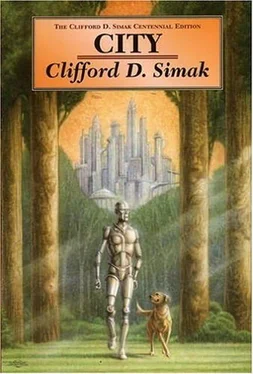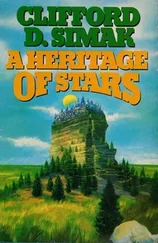Clifford Simak - City
Здесь есть возможность читать онлайн «Clifford Simak - City» весь текст электронной книги совершенно бесплатно (целиком полную версию без сокращений). В некоторых случаях можно слушать аудио, скачать через торрент в формате fb2 и присутствует краткое содержание. Жанр: Фантастика и фэнтези, на английском языке. Описание произведения, (предисловие) а так же отзывы посетителей доступны на портале библиотеки ЛибКат.
- Название:City
- Автор:
- Жанр:
- Год:неизвестен
- ISBN:нет данных
- Рейтинг книги:3 / 5. Голосов: 1
-
Избранное:Добавить в избранное
- Отзывы:
-
Ваша оценка:
- 60
- 1
- 2
- 3
- 4
- 5
City: краткое содержание, описание и аннотация
Предлагаем к чтению аннотацию, описание, краткое содержание или предисловие (зависит от того, что написал сам автор книги «City»). Если вы не нашли необходимую информацию о книге — напишите в комментариях, мы постараемся отыскать её.
City — читать онлайн бесплатно полную книгу (весь текст) целиком
Ниже представлен текст книги, разбитый по страницам. Система сохранения места последней прочитанной страницы, позволяет с удобством читать онлайн бесплатно книгу «City», без необходимости каждый раз заново искать на чём Вы остановились. Поставьте закладку, и сможете в любой момент перейти на страницу, на которой закончили чтение.
Интервал:
Закладка:
"But today that is no longer true. With the family plane, one hundred miles today is a shorter distance than five miles back in 1930. Men can fly several hundred miles to work and fly home when the day is done. There is no longer any need for them to live cooped up in a city.
"The automobile started the trend and the family plane finished it. Even in the first part of the century the trend was noticeable – a movement away from the city with its taxes, its stuffiness, a move towards the suburb and close-in acreages. Lack of adequate transportation, lack of finances held many to the city. But now, with tank farming destroying the value of land, a man can buy a huge acreage in the country for less than he could a city lot forty years ago. With planes powered by atomic there is no longer any transportation problem."
He paused and the silence held. The mayor wore a shocked look. King's lips moved, but no words came. Griffin was smiling.
"So what have we?" asked Webster. "I'll tell you what we have. Street after street, block after block, of deserted houses, houses that the people just up and walked away from. Why should they have stayed? What could the city offer them? None of the things that it offered the generations before them, for progress has wiped out the need of the city's benefits. They lost something, some monetary consideration, of course, when they left the houses. But the fact that they could buy a house twice as good for half as much, the fact that they could live as they wished to live, that they could develop what amounts to family estates after the best tradition set them by the wealthy of a generation ago – all these things outweighed the leaving of their homes.
"And what have we left? A few blocks of business houses. A few acres of industrial plants. A city government geared to take care of a million people without the million people. A budget that has run the taxes so high that eventually even business houses will move to escape those taxes. Tax forfeitures that have left us loaded with worthless property. That's what we have left.
"If you think any Chamber of Commerce, any ballyhoo, any bare-brained scheme will give you the answers, you're crazy. There is only one answer and that is simple. The city as a human institution is dead. It may struggle on a few more years, but that is all."
"Mr. Webster-" said the mayor.
But Webster paid him no attention.
"But for what happened today," he said, "I would have stayed on and played doll house with you. I would have gone on pretending that the city was a going concern. Would have gone on kidding myself and you. But there is, gentlemen, such a thing as human dignity."
The icy silence broke down in the rustling of papers, the muffled cough of some embarrassed listener.
But Webster was not through.
"The city failed," he said, "and it is well it failed. Instead of sitting here in mourning above its broken body you should rise to your feet and shout your thanks it failed.
"For if this city had not outlived its usefulness, as did every other city – if the cities of the world had not been deserted, they would have been destroyed. There would have been a war, gentleman, an atomic war. Have you forgotten the 1950s and the 60s? Have you forgotten waking up at night and listening for the bomb to come, knowing that you would not hear it when it came, knowing that you would never hear again, if it did come?
"But the cities were deserted and industry was dispersed and there were no targets and there was no war.
"Some of you gentlemen," he said, "many of you gentlemen are alive today because the people left your city.
"Now, for God's sake, let it stay dead. Be happy that it's dead. It's the best thing that ever happened in all human history."
John J. Webster turned on his heel and left the room.
Outside on the broad stone steps, he stopped and stared up at the cloudless sky, saw the pigeons wheeling above the turrets and spires of the city hall.
He shook himself mentally, like a dog coming out of a pool. He had been a fool, of course. Now he'd have to hunt for a job and it might take time to find one. He was getting a bit old to be hunting for a job.
But despite his thoughts, a little tune rose unbidden to his bps. He walked away briskly, lips pursed, whistling soundlessly.
No more hypocrisy. No more lying awake nights wondering what to do – knowing that the city was dead, knowing that what he did was a useless task, feeling like a heel for taking a salary that he knew he wasn't earning. Sensing the strange, nagging frustration of a worker, who knows his work is nonproductive.
He strode towards the parking lot, heading for his helicopter.
Now maybe, he told himself, they could move out into the country the way Betty wanted to. Maybe he could spend his evenings tramping land that belonged to him. A place with a stream. Definitely it had to have a stream he could stock with trout.
He made a mental note to go up into the attic and check his fly equipment.
Martha Johnson was waiting at the barnyard gate when the old car chugged down the lane.
Ole got out stiffly, face rimmed with weariness.
"Sell anything?" asked Martha.
Ole shook his head. "It ain't no use. They won't buy farm-raised stuff. Just laughed at me. Showed me ears of corn twice as big as the ones I had, just as sweet and with more even rows. Showed me melons that had almost no rind at all. Better tasting, too, they said."
He kicked at a clod and it exploded into dust.
"There ain't no getting around it," be declared. "Tank farming sure has ruined us."
"Maybe we better fix to sell the farm," suggested Martha.
Ole said nothing.
"You could get a job on a tank farm," she said. "Harry did. Likes it real well."
Ole shook his head.
"Or maybe a gardener," said Martha. "You would make a right smart gardener. Ritzy folks that's moved out to big estates like to have gardeners to take care of flowers and things. More classy than doing it with machines."
Ole shook his head again. "Couldn't stand to mess around with flowers," he declared. "Not after raising corn for more than twenty years."
"Maybe," said Martha, "we could have one of them little planes. And running water in the house. And a bathtub instead of taking a bath in the old washtub by the kitchen fire."
"Couldn't run a plane," objected Ole.
"Sure you could," said Martha. "Simple to run, they are. Why, them Anderson kids ain't no more than knee-high to a cricket and they fly one all over. One of them got fooling around and fell out once, but-"
"I got to think about it," said Ole desperately. "I got to think."
He swung away, vaulted a fence, headed for the fields. Martha stood beside the car and watched him go. One lone tear rolled down her dusty cheek.
"Mr. Taylor is waiting for you," said the girl.
John I. Webster stammered. "But I haven't been here before. He didn't know I was coming."
"Mr. Taylor," insisted the girl, "is waiting for you."
She nodded her head towards the door. It read:
BUREAU OF HUMAN ADJUSTMENT
"But I came here to get a job," protested Webster. "I didn't come to be adjusted or anything. This is the World Committee's placement service, isn't it?"
"That is right," the girl declared. "Won't you see Mr. Taylor?"
"Since you insist," said Webster.
The girl clicked over a switch, spoke into the intercommunicator. "Mr. Webster is here, sir."
"Send him in," said a voice.
Hat in hand, Webster walked through the door.
The man behind the desk had white hair but a young man's face. He motioned towards a chair.
"You've been trying to find a job," he said.
"Yes," said Webster, "but-"
"Please sit down," said Taylor. "If you're thinking about that sign on the door, forget it. We'll not try to adjust you."
Читать дальшеИнтервал:
Закладка:
Похожие книги на «City»
Представляем Вашему вниманию похожие книги на «City» списком для выбора. Мы отобрали схожую по названию и смыслу литературу в надежде предоставить читателям больше вариантов отыскать новые, интересные, ещё непрочитанные произведения.
Обсуждение, отзывы о книге «City» и просто собственные мнения читателей. Оставьте ваши комментарии, напишите, что Вы думаете о произведении, его смысле или главных героях. Укажите что конкретно понравилось, а что нет, и почему Вы так считаете.











